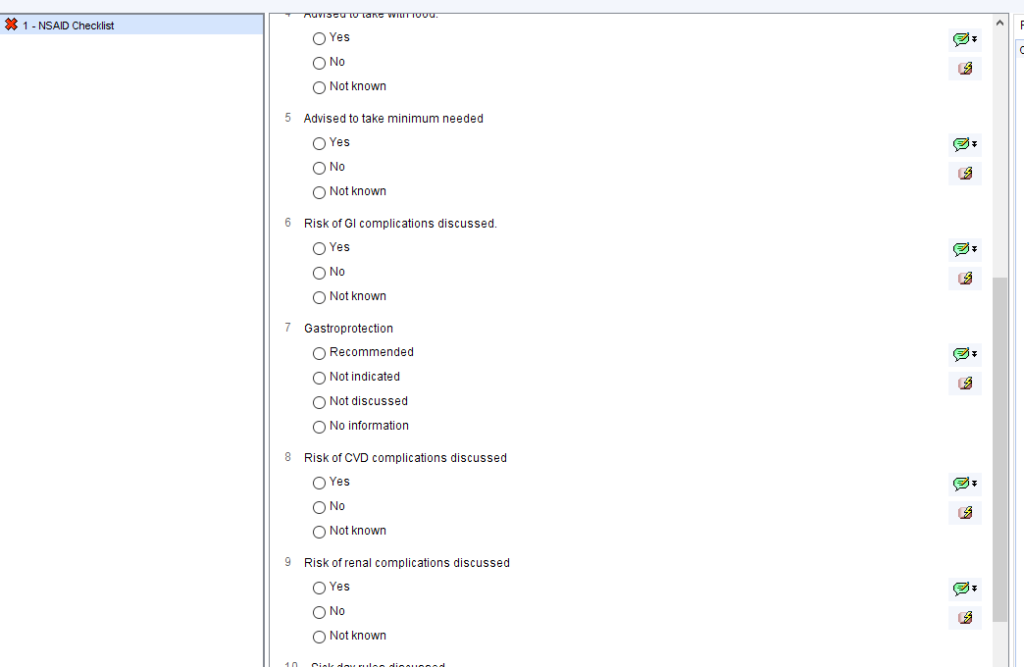The following CDRC resources are available to support safe NSAID Prescribing.
Set-up
Ensure the following protocols are active by going to Setup >Workflow Support > Protocol
![NSAID Aceclofenac Checklist
NSAID Celecoxib Checklist
NSAID Checklist (manual start)
NSAID Diclofenac Checklist
NSAID Etodolac Checklist
NSAID Etoricoxib Checklist
NSAID Flurbiprofen Checklist
NSAID Generic Checklist
NSAID Ibuprofen Checklist
NSAID Indometacin Checklist
NSAID Ketoprofen Checklist
NSAID Nabumetone Checklist
NSAID Naproxen Checklist
NSAID Piroxicam Checklist
NSAID Sulindac Checklist
OCS / Medication
OCS / Medication
OCS / Medication
OCS / Medication
OCS / Medication
OCS / Medication
OCS / Medication
OCS / Medication
OCS / Medication
OCS / Medication
OCS / Medication
OCS / Medication
OCS / Medication
OCS / Medication
OCS / Medication
Z]
Z]
Z]
Z]
Z]
Z]
Z]
Z]
Z]
Z]
Z]
Z]
Z]
Z]
Z]
DCS
ocs
ocs
ocs
ocs
ocs
ocs
ocs
ocs
ocs
ocs
ocs
ocs
ocs
OCS](https://cdrc.nhs.uk/wp-content/uploads/2022/09/image-290.png)
Reports
A series of reports, found in CDRC Quality > Rheumatology, are available to support safe prescribing of systemic NSAIDs.

| Report Name | Patients Returned |
| ? NSAID Safety 1: Contraindication # | Patients on repeat NSAIDs with a clear contraindication |
| ? NSAID Safety 2.1: Caution # | Patients on repeat NSAIDs with a condition suggesting caution is needed |
| ? NSAID Safety 2.2: Caution >1 # | Patients on repeat NSAIDs with >1 condition suggesting caution is needed |
| ? NSAID Safety 3: No obvious indication # | Patients on repeat NSAIDs without clear indication. Only applies to a small number of NSAIDs such as COX2 inhibitors. |
| ? NSAID Safety 4.1: Renal impairment -eGFR <30 # | Patients on repeat NSAIDs whose last eGFR was <30 |
| ? NSAID Safety 4.2: Risk of renal impairment # | Patients on repeat NSAIDs with a risk factor for renal impairment |
| ? NSAID Safety 4.3: Risk of renal impairment >1 # | Patients on repeat NSAIDs with >1 risk factor for renal impairment |
| ? NSAID Safety 5: Consider gastroprotection # | Patients on repeat NSAIDs where presence of risk factors suggests gastroprotection should be considered* |
| ? NSAID Safety 6.1: Etoricoxib 90 or 120 but never had 60mg # | Safety report based on MHRA alert that lowest dose of etoricoxib should be used |
| ? NSAID Safety 6.2: Very high dose etoricoxib on repeat # | Safety report based on MHRA alert. 120mg dose not licensed for long term use. |
| ? NSAID Safety 7: Regular NSAIDs but not on repeat # | Patients who appear to be receiving recurrent acute issues of systemic NSAIDs. Consider adding the NSAIDs to repeat so prescribing can be monitored more systematically. |
| ? NSAID Safety 8: More than one NSAID # | Patients on more than one repeat NSAID. |
*This is linked to the more comprehensive Gastroprotection system that covers other relevant medication such as steroids and antiplatelets.
NSAIDs Template
How to Access:
In the lower left hand corner use the search bar, type in ‘NSAIDs – CDRC’ and select the template:
Alternatively, press F12 and search for ‘NSAIDs – CDRC’, this will open the aforementioned template.
NSAIDs Template:
The NSAID template provides the key information needed to support safe prescribing. An example is shown below from a patient at high risk of complications. There are also:
- Links to tabs showing more specific information for individual NSAIDs.
- Link to a patient information leaflet
- Link to CKS guidelines
- Link to BNF section on NSAIDs

The NSAID Comparison page provides an overview of the relative risks and benefits of various NSAIDs.

The Gastroprotection for NSAIDs button is a link to more detailed information to support measures to reduce gastrointestinal adverse reactions.

The NSAID Checklist button runs the NSAID safety protocol and prompts users to complete the safety checklist with the patient – more details below.
The NSAID Scripts in the last year button displays all issues of NSAIDs in the last year

NSAIDs Checklist
The NSAID checklist is a protocol that runs a series of checks and provides warnings to support safe NSAID prescribing. The checklist can be triggered in the following ways:
- By clicking the NSAID Checklist button on the NSAID template
- By adding the protocol to one of your own toolbars
- (If activated at the practice) Will launch automatically if:
- An NSAID is added to repeat medication OR
- An NSAID is prescribed for the first time in the last 12 months
The protocol runs the following checks:
- Are there contraindications to NSAID use e.g. celecoxib and previous stroke?
- Are there issues that suggest caution is needed?
- For certain drugs (such as COX2 inhibitors) is there a clear licensed indication?
- Is more than one NSAID being used?
- Are there risk factors for GI adverse reactions and is gastroprotection being prescribed?
- Are there risk factors for renal impairment?
Each warning is accompanied by a link to the NSAID template so the relevant issues can be seen in more detail.

The protocol provides recommendations on monitoring that may be required such as follow up blood pressure, renal and anaemia testing

Finally the protocol offers a link to a checklist to run through with the patient.


Once completed, information from the checklist is displayed on the NSAID Template.
NSAIDs Monitoring
The CDRC Drugs Requiring Monitoring system includes 12 monthly renal function monitoring for patients on repeat NSAIDs if they have at least one risk factor for renal impairment. An additional six monthly check is prompted by the system if more than one risk factor is present.
